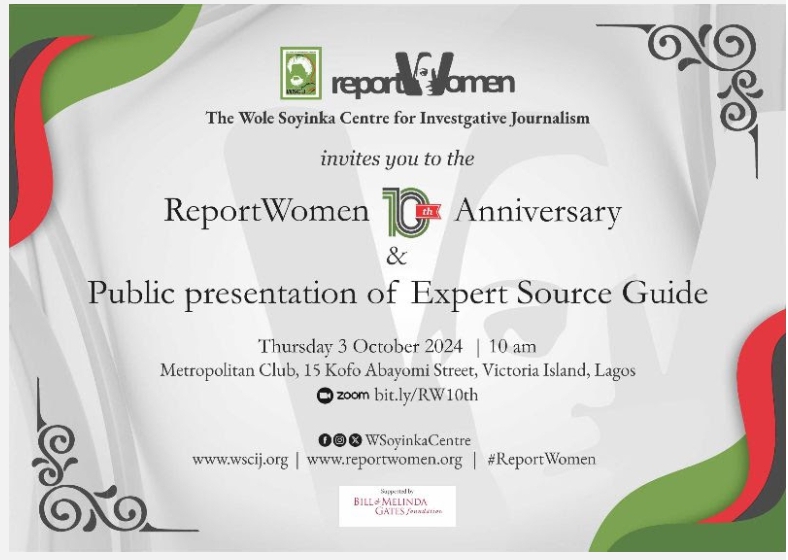By Dare Akogun
The Wole Soyinka Centre for Investigative Journalism (WSCIJ) is set to publicly launch its female experts source guide website, ‘Report Women! Experts’, as part of the activities marking the 10th anniversary of its Report Women Programme.
The event is scheduled to take place on Thursday, 3 October 2024, at the Metropolitan Club, Victoria Island, Lagos, by 10 a.m.
The Report Women! Experts source guide was developed to address the significant underrepresentation of women as expert sources in the Nigerian media.
According to findings from WSCIJ’s 2024 report, titled Who leads the newsrooms and news?, men dominate media expert representation at 87.9%, while women make up only 12.1%.
Currently, the platform features over 500 female experts across diverse fields, including Agriculture, Business and Economy, Education, Health and Science, Law, Media, Politics and Governance, and Security.
The aim is to ensure that journalists have access to relevant female voices, thereby promoting gender diversity in media reporting.
WSCIJ also plans to expand the guide to cover additional fields and will allow female experts to submit their profiles for consideration.
The public presentation of the Report Women! Experts source guide will include the unveiling of the website, a demonstration of its functionalities, and a panel discussion on the impact of promoting gender balance in media representation.
This initiative is part of WSCIJ’s Report Women! News and Newsroom Engagement Project, which is supported by the Bill & Melinda Gates Foundation.
WSCIJ’s Executive Director, Motunrayo Alaka, noted that the Report Women initiative, which was launched in 2014, has made significant strides in enhancing the quality and quantity of reports about women and girls in Nigeria.
According to her The Report Women Experts platform is seen as a key step in ensuring more female representation in Nigerian media, providing a vital resource for journalists seeking female perspectives across sectors.
“Over the past decade, the programme has produced 86 fellows, trained 537 reporters across Nigeria and Ghana, and impacted nearly 3,000 beneficiaries through various leadership projects.
“Additionally, 136 stories focused on women’s issues have been produced, along with 6 documentaries and 4 research reports,” she said.

